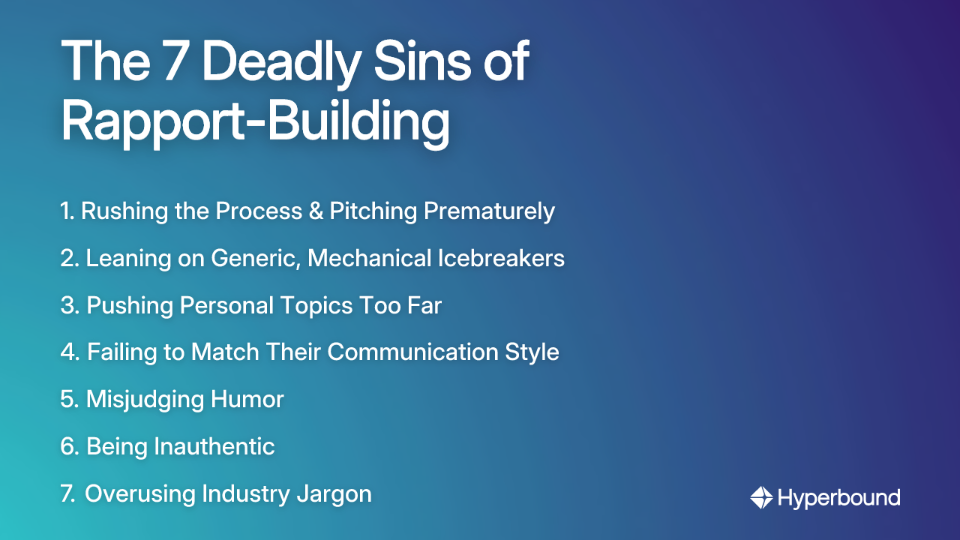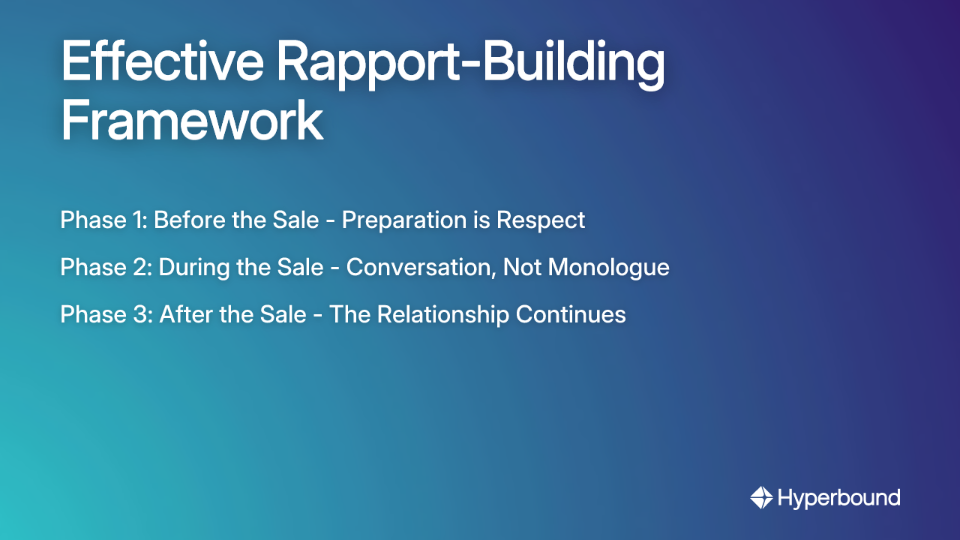
You've just gotten on a sales call. You clear your throat and launch into your well-rehearsed opener:
"Hey Mike! How are you today? How's life? Beautiful weather we're having, isn't it? How's the year going so far?"
Mike, who has already heard this exact script five times today, is mentally checking out before you've even gotten to your actual pitch. You're essentially trying to sleep with him on the first date, and both of you know it.
Sound familiar?
If you're nodding your head, you're not alone. The truth is, most salespeople have been taught a fundamentally flawed approach to building rapport. As one sales professional bluntly put it, "Everyone knows rapport building is fake as fuck." Another noted, "A prospect isn't looking for a friend." They're right—but that doesn't mean rapport itself is useless.
The problem isn't rapport. It's how you're trying to build it.
Redefining Rapport: Beyond Surface-Level Small Talk
Let's start by clearing up what rapport is NOT:
- It's not becoming the prospect's best friend
- It's not a checklist of generic questions about weather or sports
- It's not a manipulative tactic to trick someone into a sale
- It's not something you can establish in the first five minutes of a call
Real rapport is something much more valuable. It's a strategic skill and a disciplined process that creates a climate of trust and understanding between you and your prospect. It's about establishing credibility and demonstrating that you genuinely understand their situation.
As one Reddit user wisely noted, "You're not going to build rapport on first phone call. Maybe credibility but not rapport." This insight is crucial—rapport is a marathon, not a sprint.
The Psychology Behind Why People Buy from People They Trust
We're living in an era of profound distrust. According to Pew Research, a staggering 71% of Americans believe interpersonal trust has worsened in the last two decades. Against this backdrop, your prospects are approaching interactions with built-in skepticism.
This is why the traditional "know, like, and trust" factor still matters—perhaps more than ever. But here's the key: trust isn't built through superficial interactions. It's built through:
- Demonstrating competence - Showing you know what you're talking about
- Exhibiting genuine interest - Proving you care about their problems
- Delivering consistent value - Providing insights before asking for anything in return
When you approach rapport-building with this psychological framework, you transform from a transaction-focused salesperson into a trusted advisor. Your tonality, pace, and articulation all communicate whether you're there to help or just to sell.
The 7 Deadly Sins of Rapport-Building
Before we rebuild a better approach, let's examine where most salespeople go wrong when trying to establish rapport:

1. Rushing the Process & Pitching Prematurely
This is the classic "trying to sleep with them on the first date" mistake. When you jump into your pitch too quickly, you signal that you care more about closing than understanding. Taking time to connect is essential; attempting to sell immediately creates resistance.
Your inflection and volume often give away your desperation when you're rushing to the pitch.
2. Leaning on Generic, Mechanical Icebreakers
"How about those Yankees?" "Beautiful weather we're having!" These clichés feel disengaging and undermine your credibility. They're the verbal equivalent of filler words – they take up space without adding value.
3. Pushing Personal Topics Too Far
There's a fine line between finding common ground and being intrusive. When you dive too deep into personal matters too quickly, you make prospects uncomfortable.
Try using the F.O.R.D. method instead – carefully touching on Family, Occupation, Recreation, and Dreams in a natural, non-interrogative way.
4. Failing to Match Their Communication Style
If your prospect is all business and you're cracking jokes, there's a disconnect. If they speak slowly and methodically while you're rapid-firing questions, you're creating friction.
Reading and matching their pace and pitch creates an unconscious feeling of alignment. This "mirroring technique" is about calibration, not mimicry.
5. Misjudging Humor
Humor is subjective and risky in new relationships. A joke that falls flat can create awkwardness that persists throughout the call.
Use the "Two-Second Rule": if you have to think for more than two seconds about whether a joke is appropriate, skip it.
6. Being Inauthentic
Nothing destroys trust faster than inauthenticity. Prospects can sense when you're putting on a performance rather than being yourself.
Your emotional cues and confidence are transparent indicators of authenticity. As one sales professional advised, "Just be a real person and read the room."
7. Overusing Industry Jargon
Complex or industry-specific language can create distance and make the buyer feel uninformed or inferior. This is especially problematic in a non-visual medium like phone sales calls, where you can't see their confusion.
A Modern Framework for Building Rapport That Works
Now that we understand what not to do, let's replace these mistakes with a more effective approach:

Phase 1: Before the Sale (Preparation is Respect)
Do Your Homework:
- Research their company, industry, recent news, and role
- Look for genuine connections on LinkedIn or other platforms
- Prepare thoughtful questions that demonstrate your interest and expertise
This preparation is the antidote to generic icebreakers. It shows respect for their time and positions you as a professional who comes prepared.
Set the Stage:
- Send a concise, value-focused agenda before the call
- Include a personalized note that references something specific to them
- Establish clear expectations about the purpose and length of the conversation
These pre-call touchpoints create a connection before the meeting even starts.
Phase 2: During the Sale (It's a Conversation, Not a Monologue)
Practice True Active Listening:
- Focus completely on understanding, not just waiting for your turn
- Pay attention to their tonality, inflection, and other emotional cues
- Use reflective listening: "So if I understand correctly, your main challenge is..."
Active listening demonstrates persuasiveness far more effectively than any pitch. When people feel heard, they naturally become more receptive.
Ask Insightful, Open-Ended Questions:
- "What does success look like for this initiative?"
- "How would solving this problem impact your team personally?"
- "What's been your experience with similar solutions?"
These questions go beyond data-gathering—they help the prospect articulate their own needs more clearly, which is invaluable on a non-visual medium like phone sales calls.
Calibrate and Adapt:
- Adjust your pace, volume, and formality to mirror theirs
- If they're direct and to-the-point, respect that and minimize small talk
- If they seem reflective, give them space to process
This calibration shows emotional intelligence and builds unconscious rapport.
Phase 3: After the Sale (The Relationship is Just Beginning)
Meaningful Follow-Up:
- Send personalized notes that reference specific points from your conversation
- Share relevant articles or resources without asking for anything in return
- Check in at meaningful intervals, not just when it's time to renew
Each touchpoint should reinforce that you see them as more than just a commission.
Special Consideration: Building Rapport for Introverts
Many salespeople struggle with rapport because they're introverts trying to follow an extrovert's playbook. If you identify with the anxiety of "sparking up conversations with strangers" or "overthinking" interactions, here's good news:
Introverts often excel at rapport once they stop trying to be extroverts. Your natural tendencies toward preparation, thoughtful questioning, and deep listening are rapport superpowers—not weaknesses.
- Leverage preparation: Your tendency to research thoroughly before calls is an advantage
- Embrace your listening skills: Introverts typically excel at picking up subtle cues
- Quality over quantity: Focus on fewer, deeper conversations rather than rapid-fire networking

From Seller to Trusted Advisor: The New Paradigm
The traditional view of rapport as superficial pleasantries is outdated and ineffective. Today's buyers are sophisticated, time-pressed, and bombarded with sales pitches. They don't need another friend—they need a trusted advisor who understands their challenges and can guide them toward solutions.
Real rapport isn't built in the first five minutes of small talk. It's built through every interaction, every question you ask, every insight you share, and every promise you keep.
By replacing mechanical icebreakers with genuine curiosity, you transform the sales process from a transaction into a collaboration. You signal that you're there to solve problems, not just to sell products.
As one successful sales leader put it, "It's only a waste of time if you are doing it wrong." With the framework above, you can build rapport that feels authentic, respects your prospect's time, and establishes the foundation for a productive long-term relationship.
So the next time you're tempted to ask about the weather, pause. Instead, ask a question that shows you've done your homework and genuinely care about their challenges. That's when rapport stops being "fake as fuck" and starts being the powerful tool it was always meant to be.
Your articulation of value, free from filler words and backed by genuine confidence, will create the kind of rapport that actually closes deals and builds lasting relationships. And that's the kind of personal development that transforms average salespeople into trusted advisors their clients can't imagine doing business without.
Frequently Asked Questions
What is the most effective way to build rapport in sales?
The most effective way to build rapport is to establish trust and credibility through genuine interest and competence, rather than relying on superficial small talk. It's a strategic process that involves thorough research before a call, asking insightful questions that demonstrate you understand the prospect's challenges, and actively listening to their needs. This approach positions you as a trusted advisor, not just a salesperson.
Why is traditional rapport-building with small talk often ineffective?
Traditional small talk about weather or sports is ineffective because prospects recognize it as an insincere, scripted tactic. In an era of high distrust, generic icebreakers undermine your credibility and signal that you're just following a sales playbook. Prospects are looking for experts who can solve their problems, not another friend, so your opening should demonstrate respect for their time and intelligence.
How can I build rapport without sounding fake?
To build rapport authentically, focus on preparation and genuine curiosity instead of performance. Do your homework on the prospect's company and role. During the conversation, practice active listening, ask open-ended questions about their business challenges, and adapt your communication style to match theirs. Being a real, prepared person is more effective than trying to act out a "sales personality."
What is the difference between building rapport and establishing credibility?
Credibility is the foundation of rapport; you often establish credibility first by demonstrating your expertise and competence. Rapport is the resulting climate of trust and understanding that grows from that credibility over time. You can build credibility on a single call by showing you've done your research, but true rapport is the outcome of multiple interactions where you consistently provide value.
How can introverted salespeople build rapport effectively?
Introverted salespeople can build rapport effectively by leveraging their natural strengths: thorough preparation, deep listening, and asking thoughtful questions. Instead of trying to emulate an extroverted playbook, introverts should lean into their ability to research prospects, listen intently to verbal and non-verbal cues, and facilitate deeper, more meaningful conversations. These skills are rapport-building superpowers.
What are some good alternatives to generic icebreakers?
Good alternatives to generic icebreakers are thoughtful, personalized opening questions that show you've done your research. Try referencing a recent company announcement, a post they shared on LinkedIn, or a challenge common to their industry. For example: "I saw your company just launched a new initiative in X; I was curious how that's impacting your team's priorities?" This immediately establishes you as a prepared and relevant professional.

Book a demo with Hyperbound
.png)













